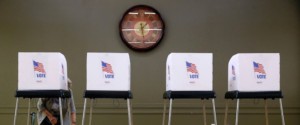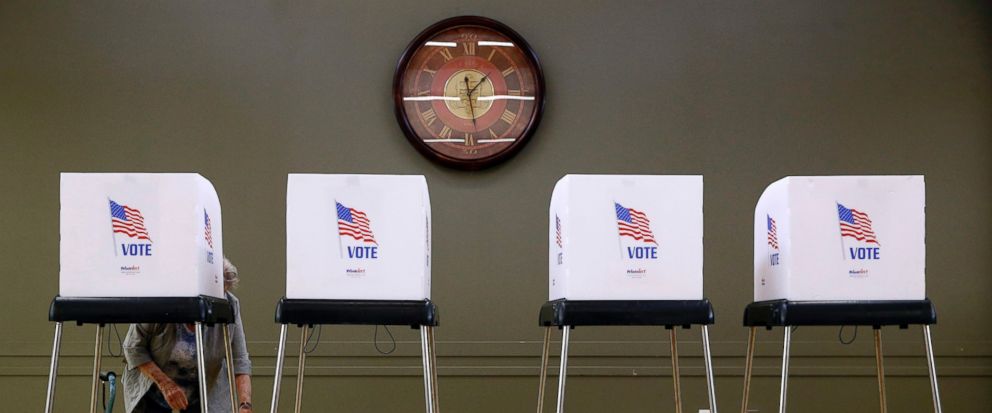 BALTIMORE: Bitterness clashing with hope. Calls for civility colliding with cries for payback. Unity versus division.
BALTIMORE: Bitterness clashing with hope. Calls for civility colliding with cries for payback. Unity versus division.
The often conflicting motivations of U.S. voters in June 26 elections seem emblematic of where the nation stands at 2018’s turbulent midpoint, as the country’s two major parties continue on starkly divergent roads toward November midterms.
Outside polling stations, no single issue drew more passionate responses from voters across seven U.S. states than headline-making immigration controversies during the latest round of primary contests.
In Maryland, Patricia Lane was determined to vote despite months of exhausting chemotherapy treatments, primarily because of the Trump administration’s decision to separate migrant youngsters from their parents when apprehended at the U.S.-Mexico border.
“We’re who they’re afraid of at the ballot box. We don’t like children being separated from their parents,” Lane said in Bethesda, just outside of the nation’s capital.
Another voter in the blue mid-Atlantic state, 72-year-old retired federal government worker William Gossard, said Trump’s hardline approach on immigration was perfectly reasonable.
“The law is you have to apply for citizenship, not just drag your child here and pretend you’re a parent,” the registered Republican from Centreville said.
Voters who themselves have immigrated to the United States made a point of making their voices heard, some voting for their first time ever in a party primary.
“This president is very bad for immigrant people,” said Nancy Sullca, a 41-year-old housekeeper in New York City who emigrated from Peru in 2001 and registered as a Democrat when she received her citizenship.
Another thorny issue on people’s minds was the growing political polarization of American society. Many of the latest batch of primary voters said they were disturbed by the expanding divisions, noting a Virginia restaurant’s decision to ask White House press secretary Sarah Huckabee Sanders to leave because staff didn’t want to serve her.
“We’re going in a bad direction. This political air we’re breathing, it’s not good for us. That Sanders thing, nobody should be treated like that,” said James Dorsey, an African-American contractor in Baltimore who spent his childhood in Mobile, Alabama. “That’s like some Jim Crow stuff.”
Voters on both ends of the political spectrum criticized the rise of incivility. Some voters said conservatives needed to stop abusing their power and mocking the views of those who disagree with them, while some on the left were chastised for portraying ideological opponents as knuckle-dragging oppressors who must be publicly shamed.
America’s deeply engaged older voters seemed the most unnerved with the country’s growing disregard for civility. Younger voters appeared somewhat more accepting of the sometimes toxic nature of 2018’s political discourse.
Some voters told The Associated Press that aggressive pushback could be a reasonable reaction to what they see as the Trump administration’s concerted effort to unravel the legacy of former President Barack Obama and break with what they see as basic decency.
“The people in Trump’s government have blinders on. They’re busy lying, saying whatever they want. So I don’t think they should be surprised when other people feel some kind of way,” said Lamont Cosby, a 42-year-old Democrat in Baltimore.
Other voters emphasized that they wanted the nation and their states to be governed by values of respect and empathy, even as some grow increasingly concerned that aspects of the social fabric have been forever shredded.
In Colorado, 32-year-old Vincent Clouse said transparency and honesty were the things he wanted to see most from his next elected officials.
“I feel like we really need it right now,” said Clouse, an unaffiliated voter who voted for Democrat Mike Johnston in the state’s governor’s race. “I don’t want to play any more games on this false news, false that. It takes healthy communication and working together.”
Although some Republican voters said they were pleased with Trump’s leadership, others voiced repulsion. One registered Republican in Utah, software engineer Alan Wessman, said he refuses to vote for any Republican who’s enthusiastic about Trump.
“I’ve been appalled at the amount of corruption and cruelty and incompetence that the current administration has shown,” said Wessman, a self-described moderate Republican. “And for any self-respecting Republican to be enthusiastic about that sends a big message to me that they’re not my candidate.”
Some who performed their civic duty – there was no shortage of registered voters who stayed away from the polls – said they doubted if any political candidate could actually be trusted to follow up on their word.
Idella Potts, a 68-year-old voter in Picayune, Mississippi, said she supported Howard Sherman in Mississippi’s U.S. Senate Democratic primary because he was in favor of safeguarding Medicare.
“Of course, they all lie, so you really don’t know who to vote for,” she added. AP







